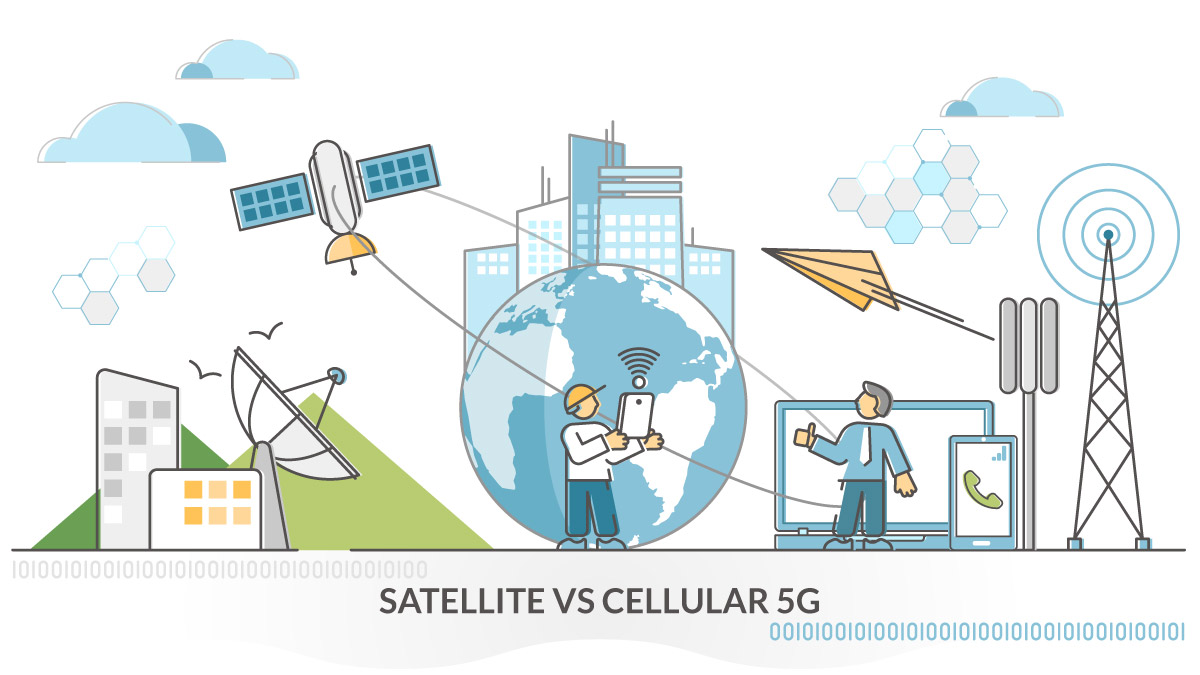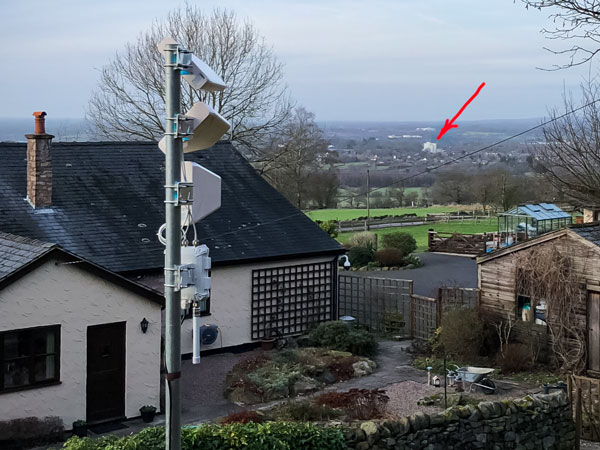Technical Benefits
Satellite Internet vs Mobile SIM Router
Struggling to obtain a stable and fast internet connection in remote areas?
Due to the lack of wired internet, staying connected in rural villages, holiday cabins, camping parks, and industrial sites could be quite challenging. Satellite internet and mobile SIM routers are the qualified remote internet options. Let’s compare them briefly.
Internet Gateway for Off-Grid Areas
Choosing a satellite or mobile internet gateway depends on your location, infrastructure, and specific connectivity requirements. Here are basic guidelines for identifying the best option for your circumstances.
The well-known satellite providers include Starlink, Viasat, and HughesNet. Satellite internet is effective in off-grid or low-signal areas. Due to its global reach, it has trade-offs like higher latency, weather disruptions, and complex installation.
In contrast, the mobile SIM card router connects to widely deployed cellular towers to access fast speeds and lower latency mobile internet. It offers lower costs and better long-term value, particularly in fixed-location deployments with mobile signal coverage.
Even more, the outdoor SIM card router features IP67-rated waterproof protection and can withstand rain, dust, humidity, heat, and freezing temperatures. It is designed for long-term use in challenging conditions.
How Does Satellite Internet Work?
A satellite network provides internet access by linking users directly to satellites that orbit the Earth, eliminating the need for terrestrial cables or mobile towers. Users generally install a dish antenna and a modem to utilize this service.
These devices enable satellite communication in space, transmitting data to and from ground stations that are integrated with the global internet backbone. This technology allows internet connectivity even in remote or underserved areas where traditional infrastructure may be lacking.
The major satellite internet providers are listed below.
Starlink
Starlink is a satellite internet service developed by SpaceX. It utilizes a network of Low-Earth Orbit (LEO) satellites positioned approximately 550 kilometers above the Earth, significantly reducing latency compared to traditional satellites.
HughesNet
HughesNet operates geostationary orbit (GEO) satellites positioned approximately 36,000 kilometers above the equator. These satellites remain fixed in relation to Earth, providing nationwide coverage.
Viasat
Also uses GEO satellites, but focuses on larger data plans and wider coverage areas, especially in North America, parts of Latin America, and Europe. Viasat is often used in aviation and enterprise backup networks.
Satellite Internet Is Ideal For:
- Completely signal-dead zones
- Mountain peaks, deserts, islands without towers
- Maritime vessels and aviation applications
Satellite Internet’s Limitations:
- Requires clear view of the sky
- High internet connection latency
- Sensitive to rain, snow, and wind
What Is A Mobile SIM Card Router?
A mobile SIM router combines a mobile modem with SIM card slots. It uses the SIM card to connect to 4G or 5G cellular networks, providing broadband internet access in areas with good mobile signal reception, without relying on wired cables or fiber infrastructure.
Once connected, it distributes the internet locally via Wi-Fi or Gigabit Ethernet ports for wired equipment such as cameras, IoT devices, industrial controllers, or office devices.
OutdoorRouter manufactures powerful SIM card routers featuring open-source firmware that integrates advanced network tools and root administrative privileges. You can modify LAN and WAN networks and even install new plugins to adapt to personalized networking requirements.
Mobile SIM Router’s Key Features:
- Ultra-fast speeds, the latest 5G-NR connectivity
- Lower latency than most satellite systems
- Stable performance in all weather conditions
- Open source firmware, VPN and remote access
- Dual SIM slots and carrier failover for flexible selection
- DC Power and is PoE-compatible for flexible power
Mobile SIM Router Is Ideal For:
- RV parks, barns, and cabins in woods with cellular coverage
- Farms, ranches, and open yards near mobile towers
- Temporary setups for events, work sites, or mobile offices
- Emergency backup internet
Key Comparison – Satellite VS Mobile Internet
| Feature | Satellite Internet | Mobile SIM Router |
| Internet Source | Orbiting satellite link | 5G/4G cellular network |
| Installation | Needs dish, modem, sky clearance | Plug-and-play with SIM, mount on pole/wall |
| Speed | 25-220 Mbps | 50-500 Mbps (based on signal strength) |
| Latency | Approx 40-600+ ms | Approx 20-40ms |
| Weather Impact | High – signal loss in bad weather | Minimal – stable in rain/fog/snow/wind |
| Carrier Flexibility | Fixed subscription only | Multi-carrier SIM, flexible data plans |
| Data Charge | High cost – approx US$120+/month | Low cost – approx US$10–60/month (SIM) |
| Mobility | Low (requires dish mounting) | Moderate (removable) |
| Power Options | AC only | PoE, AC or Battery |
| Customization | No customization | Yes – firmware/firewall/VPN |
| Maintenance | Harder to repair, higher replacement cost | Easy, modular, low cost |
| Ideal for | Ultra-remote zones with no signal | Fixed sites with mobile signal |
| Industrial Suitability | Poor – vulnerable to physical damage | Excellent – hardened for daily exposure |
Which Internet Gateway Is Better?
Choosing a satellite or mobile internet gateway depends on your location, infrastructure, and specific connectivity requirements. Here are basic guidelines for identifying the best option for your circumstances.
Choose Mobile SIM Router if
You have reliable 4G or 5G coverage in your area and want a cost-effective, easy-to-deploy solution. Mobile SIM Routers only need a SIM card and a fair mobile signal. Installation is simple as the router automatically connects to the cellular network and begins broadcasting Wi-Fi as soon as it’s powered on.
This option is ideal if you aim to be flexible and minimize monthly costs. SIM routers also offer mobility and upgrade flexibility, making them an excellent choice for temporary installations, expanding operations, or mobile deployments.
Real-World Use Cases
Choose a Satellite Internet For
Live in a completely off-grid location with no cellular signal or mobile coverage at all. Satellite internet is designed for such extreme cases, offering broadband access via satellite constellations that reach from mountaintops to deep rural valleys. It’s the right choice if you are willing to accept higher initial and monthly costs in exchange for guaranteed connectivity.
Satellite is also the preferred option for maritime, aviation, or remote exploration scenarios where terrestrial infrastructure simply doesn’t exist.
Both satellite internet and mobile SIM card router technologies have unique advantages. Choose the right internet gateway ultimately depends on your location, budget, and connectivity needs. If you are in an area with a mobile signal, the SIM router offers faster setup, lower costs, and better flexibility. However, if you are far from any infrastructure, Satellite Internet remains a powerful backup option.
Need help selecting the best internet solution for your location? Reach out to our team for a custom recommendation that suits your site’s conditions, signal quality, and connectivity goals.



